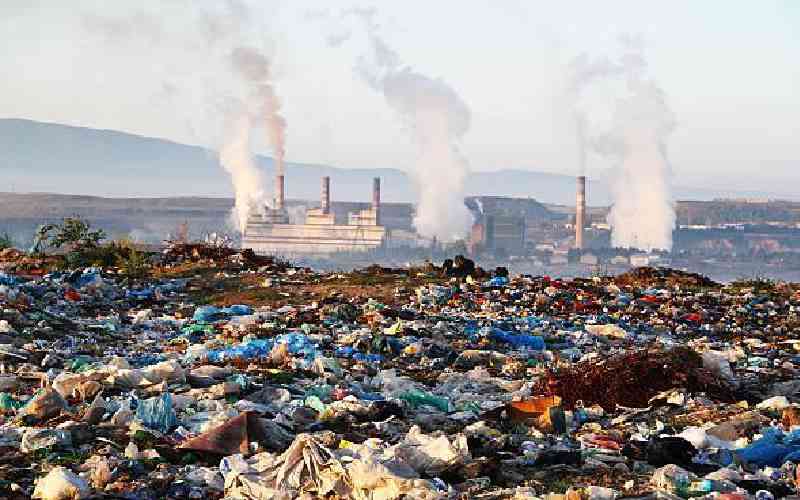
The planet has experienced an average decline of 69 percent in its species populations since 1970, a new report has revealed.
The declining trend in vertebrate populations has continued despite an array of political and private sector commitments, according to Living Planet 2022-Building a Nature-Positive Society, by World Wide Fund (WWF).
Data gathered from almost 32,000 populations of 5,230 species globally, leaves no doubt that the UN Decade on Biodiversity, meant to implement broad-based action to transform society's relationship with nature, has fallen far short of target.
The report driven by the Living Planet Index gives an early warning indicator by tracking trends in the abundance of mammals, fish, reptiles, birds and amphibians around the world.
The report comes when the world is preparing for the COP15 biodiversity summit in Montreal, Canada next month.
The biodiversity conference tasked with agreeing a new deal to protect nature - will be equally critical to pushing for protection of 30 percent of land and seas.
During the Summit, the UN plans to achieve its targets of restoring three billion hectares of land and freshwater as well as three billion hectares in seas and ocean s, reduce pesticide use and end plastic pollution with nature-based solution.
The 2022 global Living Planet Index shows an average 69 percent decrease in monitored wildlife populations between 1970 and 2018.
"Latin America shows the greatest regional decline in average population abundance 94 percent while the population trends for monitored freshwater species are also falling steeply 83 percent," reads part of the report which was written by 89 authors from 27 countries shows.

Africa, says the report, has lost 66 percent of its biodiversity in the same period with freshwater populations have been the hardest hit with an alarming decline of 83 percent since 1970, more than any other species groups.
The data was collected from around the world: the Amazon, Canada, Zambia, Kenya, Indonesia and Australia with the reporting revealing that "habitat loss and barriers to migration routes account for around half the threats to these populations."
Alice Ruhweza, Regional Director WWF- International, observed that report contained the largest dataset yet from the Living Planet Index and the most comprehensive analysis of the global state of nature.
"The findings are stark," she said during the report's launch. "While we need to urgently act to restore the health of the natural world, there is no sign that the loss of nature is being halted, let alone reversed."
She pushed for biodiversity financing at the upcoming COP15 meeting arguing that the world's richest countries have a responsibility to provide financial support to biodiversity-rich countries.
A shocking two-thirds decline in the global Living Planet Index in less than 50 years, is a red flag observed Marco Lambertini, the Director General WWF International
"This comes at a time when we are finally beginning to understand the deepening impacts of the interlinked climate and nature crises, and the fundamental role biodiversity plays in maintaining the health, productivity and stability of the many natural systems we and all life on Earth depend on," he said.
He added: "The Covid-19 pandemic has given many of us a new awareness of our vulnerability. This is beginning to challenge the unthinking assumption that we can continue to dominate the natural world irresponsibly, taking nature for granted, exploiting its resources wastefully and unsustainably, and distributing them unevenly without facing any consequences."
The report shows that climate and biodiversity crises are not separate but are two sides of the same coin.
It revealed that land-use change is still the most important driver of biodiversity loss. The cascading impacts of climate change are already affecting the natural world.
Recommending that unless we limit warming to 1.5 degrees Celsius, climate change is likely to become the dominant cause of biodiversity loss in coming decades.

Freshwater environments host rich biodiversity, including one-third of vertebrate species. Freshwater is also essential to our survival and well-being 49 in domestic use, energy production, food security, and industry 50.
Although freshwater covers less than one percent of the planet's surface, more than 50 percent of the human population lives within three kilometres of a freshwater body 51.
This human proximity can be a threat to freshwater species and habitats, including many biodiversity hotspots 182, via pollution, water abstraction or flow modification, species overexploitation and invasive species.
On disappearing oceanic sharks and rays the report states
the global abundance of oceanic sharks and rays has declined by 71 percent over the last 50 years, due primarily to an 18-fold increase in fishing pressure since 1970- reflecting an increase in extinction risk for most species.
Sharks and rays are important to the health of our oceans, yet they have become increasingly valued for their meat and medicinal properties
Jackson Kiplagat the head of conservation program WWF-Kenya says there is need to braking down ecological footprints to save the planet's biodiversity.
There is still time to act, but the urgency is needed. A number of solutions are available from business to Indigenous peoples and local communities," he said adding that "new financial disclosures to better understand and align the impact of finance to the multi-use landscape approaches" will also be needed.
 The Standard Group Plc is a multi-media organization with investments in media platforms spanning newspaper print
operations, television, radio broadcasting, digital and online services. The Standard Group is recognized as a
leading multi-media house in Kenya with a key influence in matters of national and international interest.
The Standard Group Plc is a multi-media organization with investments in media platforms spanning newspaper print
operations, television, radio broadcasting, digital and online services. The Standard Group is recognized as a
leading multi-media house in Kenya with a key influence in matters of national and international interest.


